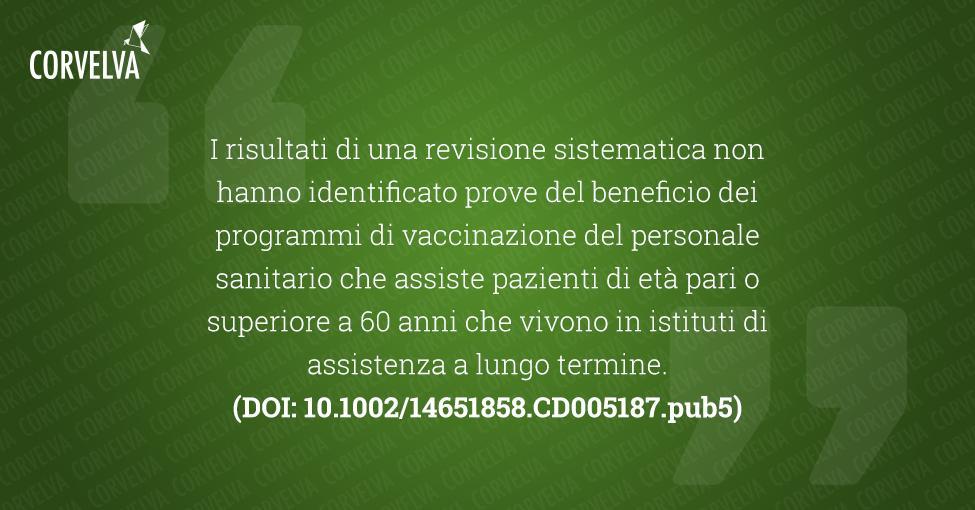Influenza vaccination for healthcare workers caring for people aged 60 and over living in long-term care institutions

- Roger E Thomas, Tom Jefferson, Toby J Lasserson
- DOI: 10.1002 / 14651858.CD005187.pub5
- 2016
Abstract
Context: a systematic review found that 3% of working adults who received the flu vaccine and 5% of those who were not vaccinated had laboratory-proven flu per season; in healthcare workers (healthcare workers) these percentages were 5% and 8% respectively. Healthcare professionals can pass the flu to patients.
Goals: identify all randomized controlled trials (RCTs) and non-RCTs evaluating the effects of vaccination of healthcare professionals on the incidence of influenza, pneumonia, death from laboratory-proven pneumonia, and hospitalization for respiratory disease in individuals aged 60 or older XNUMX years old resident in long term care institutions (LTCI).
Research methods: we searched CENTRAL (2015, issue 9), MEDLINE (1966 to week 3 October 2015), EMBASE (1974 to October 2015) and Web of Science (2006 to October 2015), but only Biological Abstracts from 1969 to March 2013 and Science Citation Index-Expanded from 1974 to March 2013 due to lack of institutional access in 2015.
Selection criteria: randomized controlled trials (RCTs) and non-RCTs on influenza vaccination of healthcare professionals caring for individuals aged 60 years and older on LTCIs and the incidence of laboratory-proven influenza and its complications (lower-pathway infection respiratory tract, or hospitalization or death due to lower respiratory tract infection) in individuals 60 years of age or older in LTCI.
Data collection and analysis: two authors independently extracted data and assessed the risk of bias. Effects on dichotomous outcomes were measured as differences in risk (RD) with 95% confidence intervals (CI). We evaluated the quality of evidence with GRADE.
Main findings: We identified four cluster-RCTs and one cohort study (n = 12.742) on influenza vaccination for healthcare professionals caring for individuals aged ≥ 60 years on LTCIs. Four RCTs of clusters (5896 residents) provided data on outcomes that addressed the objectives of our review. The studies were comparable in their study populations, interventions, and outcome measures. The studies did not report adverse events. The main sources of bias in the studies were friction, lack of blinding, contamination in the control groups, and low vaccination coverage rates in the intervention arms, leading us to reduce the quality of evidence for all outcomes due to the severe risk Providing influenza vaccination to long-term nursing home-based healthcare workers may have little or no effect on the number of residents who develop laboratory-tested influenza compared to those living in nursing homes where they do not vaccination is offered (RD 0 (95% CI -0,03 0,03), two studies with samples from 752 participants; low quality evidence). Vaccination of healthcare workers likely leads to a reduction of lower respiratory tract infection in residents from 6% to 4% (RD -0,02 (95% CI -0,04-0,01), a study involving 3400 people ; moderate quality evidence). Vaccination programs for healthcare professionals may have little or no effect on the number of hospitalized residents for respiratory disease (RD 0 (95% CI -0,02-0,02, one study of 1059 people; low-quality evidence We decided not to combine data on deaths from lower respiratory tract infection (two studies involving 4459 people) or all deaths (four studies involving 8468 people). The direction and magnitude of the risk difference varied between the Studies. We are not sure about the effect of vaccination on these results due to the very low quality of the evidence. The adjusted analyzes, which took into account the cluster design, did not differ substantially from the pooled analysis with unadjusted data. They did not differ substantially. from pooled analysis with unadjusted data. did not differ substantially from pooled analysis with unadjusted data.
Authors' conclusions: The results of our review did not identify conclusive evidence of the benefit of healthcare professionals' vaccination programs on specific outcomes of laboratory-proven influenza, its complications (lower respiratory tract infection, hospitalization, or death from lower respiratory tract disease. ) or all-cause mortality in people over 60 living in care institutions. This review found no information on co-interventions with healthcare workers vaccination: hand washing, face masks, early detection of laboratory proven influenza, quarantine, hospitalization prevention, antivirals, and questions to healthcare workers with influenza or flu-like illness (ILI) doesn't work. This review does not provide reasonable evidence to support vaccination of healthcare professionals to prevent influenza in individuals aged 60 and over residing on LTCIs.High quality RCTs are needed to avoid the risks of bias in identified methodology and conduct from this review and to further test these interventions in combination.

